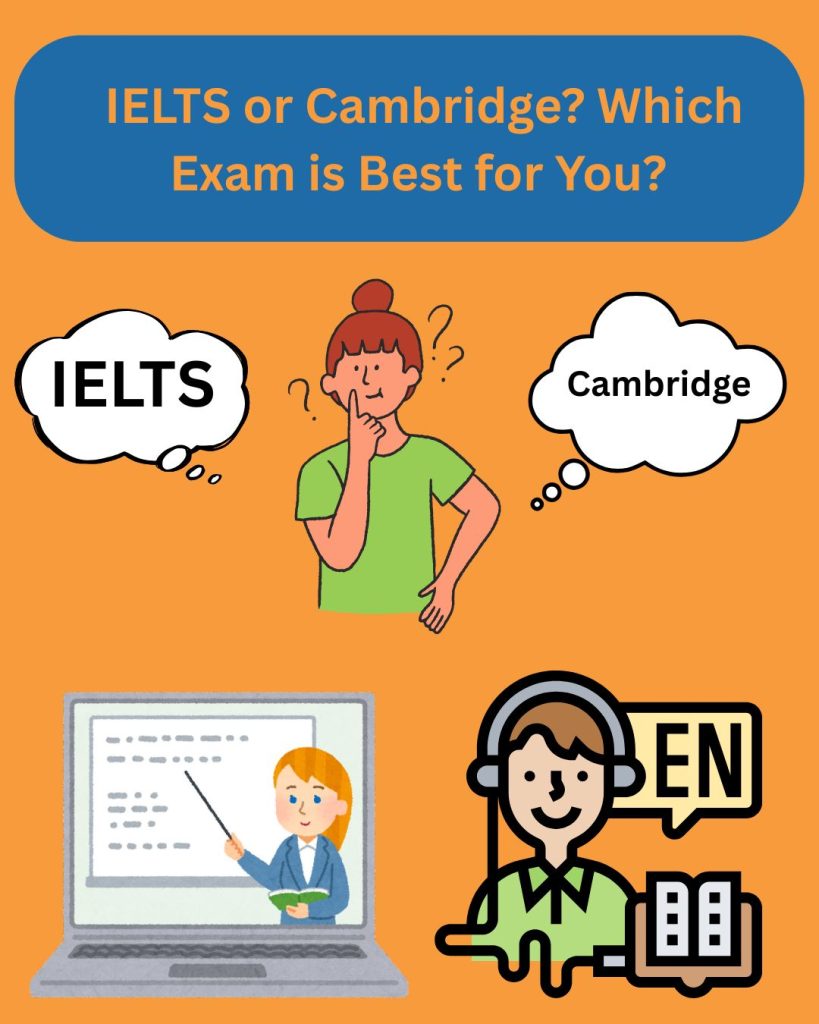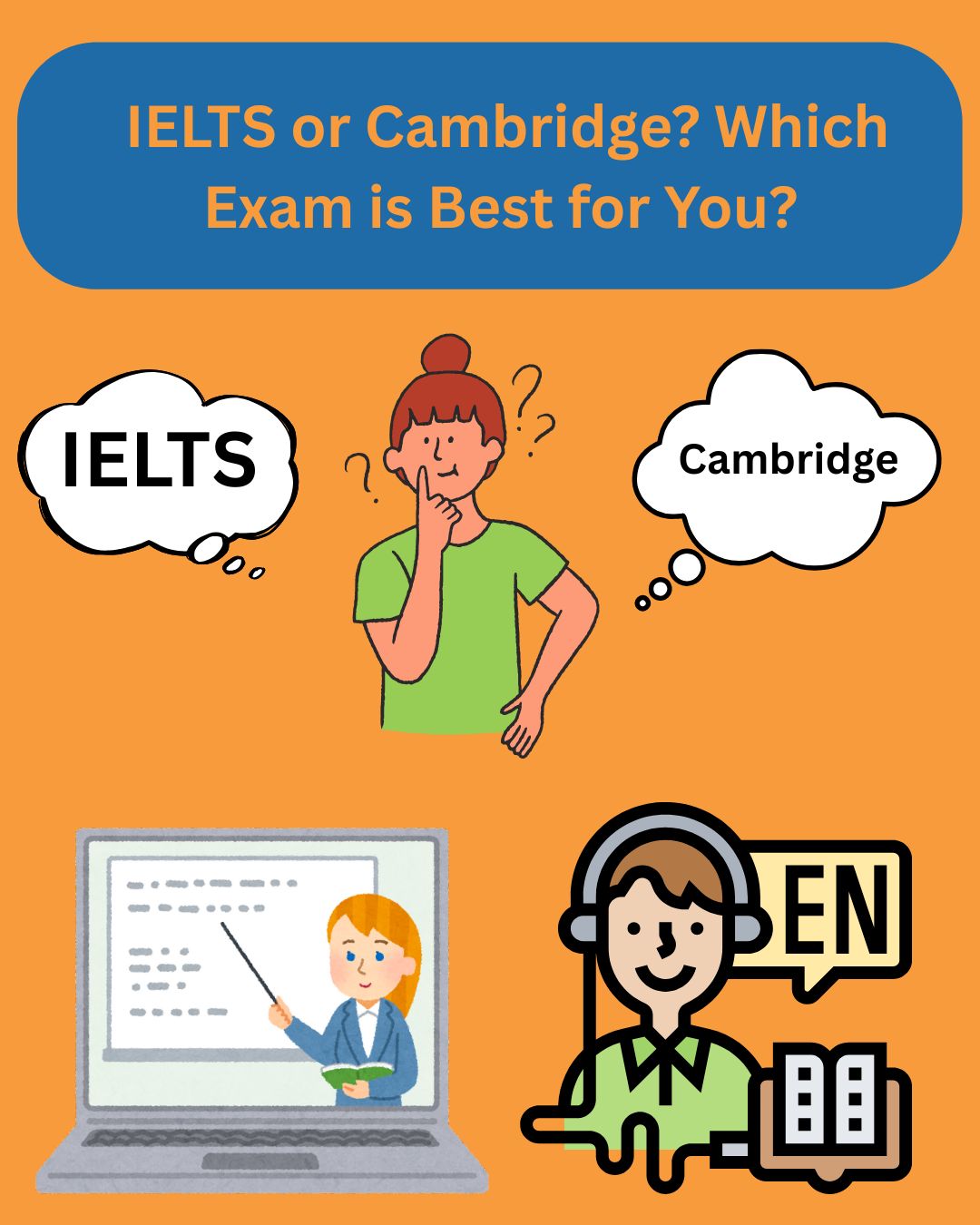
Proficiency in the English language serves as a lingua franca to communicate and connect with people from all over the world. If you are planning to study, work, or live in an English-speaking country, proving your English language skills is a crucial step. Two of the most widely accepted ways of doing so are taking the IELTS exam or the Cambridge English exams. In this blog, we will provide you with more information on the exams themselves to help you make a decision.
Top tip: lingua franca is a term for a common language that people speak to communicate if their native languages are different! This would be English in our case.
What is IELTS?

IELTS stands for International English Language Testing System and it is the international standard exam for assessing an individual’s English language skills. The exam was launched in 1980 as ELTS. However, by 1989, it had achieved a worldwide status when the International Partnership was formed. Whatever your reasons for studying English, e.g., for employment, to enter higher education, or immigration, taking the IELTS exam may be your answer.
What does the IELTS exam involve?
The IELTS exam tests the four fundamental skills of any language: speaking, listening, reading, and writing. Students at all levels of ability can take the exam and will receive a band score between 1 and 9 on each of the four sections of the test. 1 is classed as a Non-user of the English language, and 9 is classed as an expert in the English language. The student’s overall score is the average of the four section band scores rounded to the nearest half band. IELTS results are available within 2 weeks of taking the exam and are valid for 2 years. There are different types of exams depending on your reasons for studying English. We will list these below:
IELTS Academic
If you would like to study at a university and pursue higher education, or if you are seeking professional registration e.g. doctors and nurses, the IELTS Academic would be the most suitable exam. If you plan to study at a UK university, you will normally need to achieve a specific score between 4.0 in Academic IELTS for a foundation course and 7.5 for a Master’s course.
IELTS General Training
The IELTS General Training test is perfect for individuals who wish to migrate to an English-speaking country such as the UK or Australia, or for individuals who would like to train/study below degree level.
IELTS for UKVI
The IELTS tests for UK Visas and Immigration are accepted as proof of English if you want to live, work, or study in the UK. These can help support your visa applications. The tests used by the UKVI are:
- IELTS for UKVI
- IELTS for UKVI Life Skills A1
- IELTS for UKVI Life Skills A2
- IELTS for UKVI Life Skills B1
Please note that if you are looking to take the IELTS for UKVI that the UKVI will only accept tests taken in person at an official IELTS for UKVI test centre. For further information on the test requirements for UKVI visas, please click here.
Our IELTS Preparation Course is taught by several highly qualified and knowledgeable teachers who will be able to assist you with specific exam techniques and regular practice tests. At Hilderstone, we believe that while exam techniques are important to achieving the result you want, it is not the only way to be successful. We also believe that improving your English language skills further with the Intensive English Language Course will set you up for further success on your English language learning journey.
Whilst we do not offer the option to take the IELTS exam at the college, our friendly staff are always happy to assist where we can with booking the exam through a test centre or online.
More information on IELTS can be found at the official IELTS website.
What are the Cambridge English exams?

The Cambridge English exams are a universally accepted suite of English language exams that are tailored to specific levels of English. There are 5 exams that test specific levels and skillsets of the English language under the Common European Framework of Reference (CEFR): A2 Key, B1 Preliminary, B2 First, C1 Advanced, and C2 Proficiency. A2 is considered proof of your ability to use English to speak in a simple situation e.g., introducing yourself. C2 Proficiency is the highest level that can be obtained and this shows that you have exceptional fluency in the English language. We will focus on the B2 First and C1 Advanced exams for this blog, as we offer these exams at Hilderstone College at particular times throughout the year, including preparation courses. Cambridge results are available 4-6 weeks after the exam and are valid for life.
What do the Cambridge exams involve?
Like IELTS, the Cambridge exams consist of testing the four skills of any language: reading, writing, speaking, and listening. There are four papers to complete, and the test format can be either digital or paper-based. Time limits vary, estimated as being from anywhere between 3 and 4 hours long. Each candidate receives an individual score for each skill: Reading and Use of English, Writing, Listening, and Speaking. In addition, the Use of English is scored. These five scores are averaged so that candidates receive an overall score for their exam on the Cambridge English Scale. Scores are given from a minimum of 80 to a maximum of 230.
The B2 First exam (formerly known as the FCE – First Certificate in English) demonstrates that the individual student can communicate in a confident manner in an English-speaking setting. This provides you with proof that you have the necessary language skills to live and work in an English-speaking country or can confidently study on courses taught in English.
The C1 Advanced exam (formerly known as CAE – Cambridge English: Advanced) is the next level after taking the B2 First exam. Achieving this qualification demonstrates an advanced and high-level understanding of the English language to potential employers and universities. It shows that you can attend an academic course at a university level and be comfortable with participating in academic tutorials, seminars, or workplace meetings.

Our Cambridge B2 First Preparation Course and Cambridge C1 Advanced Preparation Course are the perfect courses for you to feel more confident about preparing for the exams. Our expert teachers will provide you with the tools and knowledge to achieve these qualifications. For the B2 First course, it is important to keep improving your English language skills. You will be in an Intensive English programme with classes covering grammar, vocabulary, reading and listening comprehension, types of written English, and speaking practice. You will also attend special classes focusing on exam techniques and strategies. The C1 Advanced course will cover advanced language in classes focusing on grammar and vocabulary, reading and listening comprehension, varieties of written English, and speaking practice, all of which are essential for success in this examination. More classes will also cover exam techniques and strategies for success in all four parts of the exam.
More information on the Cambridge English exams can be found at the official Cambridge English website.
So which exam is right for you? We hope this guide was useful and helped you to make the right decision. Our handy preparation courses ensure that you get the best out of your experience and aid in achieving the desired exam results on your English language learning journey.

